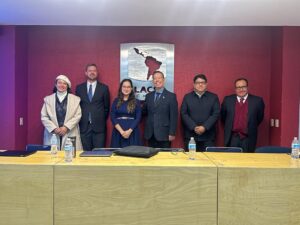The International Institute for Religious Freedom (IIRF) celebrates the successful doctoral thesis defense of Dr Camila Andrea Sánchez Sandoval last Wednesday 13 December 2023 at FLACSO Mexico (the Latin American Faculty of Social Sciences). The thesis, which received the mention “Excellent”, draws on two case studies on Mexico and Colombia and is entitled “Religious Freedom in Mexico and Colombia: Approach to Categories of Expansion and Public Policy Actions from the Perspective of Comparative Public Policy.”
In her thesis, Dr Sánchez explores the factors that lead to the broadening of religious freedom. She unravels the driving categories that have promoted the expansion of religious freedom in Mexico and Colombia from 1800 to 2023. Through a qualitative methodology and a comparative public policy approach, she meticulously examines 34 public policy documents to describe how these categories are translated into concrete government policy actions. In her research, she proposes social categories, such as the violation of religious freedom and the demands of social groups to expand this right, and political categories, such as moments of constitutional change and the religious adherence of leaders. Additionally, she considers historical factors and international influences in the expansion of this right.


In the words of the author:
“During my PhD, confronting the study of religious freedom from a public policy perspective involved a significant challenge. The limited literature available on this subject added a distinctive element to my research. Exploring the triggers that influence the expansion of religious freedom, as well as identifying moments of policy change and transfer, became a challenge. In addition, finding that there is an extensive normative framework for religious freedom in Colombia and Mexico, albeit with limited application, generated much reflection and frustration at times.”
Dr Raul Pacheco-Vega, thesis director, praises Dr Sánchez’s thesis in three dimensions:
“Theoretically, methodologically and empirically. Theoretically, Camila contributes to our understanding of the expansion of religious freedom as a process of public policy design and implementation that includes two sub-processes: policy change and policy transfer. Empirically, Camila demonstrates that the expansion of religious freedom in Mexico and Colombia emerged as a result of the shift from the conceptualization of public policies as public problem solvers to public policies that expand human rights. Given that the expansion of religious freedom is a human right, Camila demonstrates that policies to expand religious freedom emerge as a logical and consequential result of this process. Finally, methodologically, Camila offers an innovative application of discursive, narrative, and content analysis using MAXQDA to the process of coding institutional public policy documents.”
The International Director of the IIRF, Dr Dennis P. Petri, who was co-advisor of the thesis, says:
“An important part of the mission of the IIRF is to encourage the study of religious freedom in university institutions. One way we do this is by supporting postgraduate students with research projects, like Camila. Her work is groundbreaking at many levels. Beyond its empirical significance for our understanding of the religious freedom situation in Mexico and Colombia, it makes important conceptual contributions. Whilst most research on religious freedom has focused on observing and explaining religious freedom violations, very few scholars have analyzed the reasons for the broadening of religious freedom. In this sense, Camila’s work truly revolutionizes religious freedom research by developing a conceptual framework allowing to explore the various political, social, historical and international determinants of the broadening of religious freedom. This will undoubtedly inspire scholars for years to come.”
Dr Camila Sánchez received a Doctorate in Social Sciences with a specialization in Political Science from FLACSO-Mexico. She also holds a master’s degree in Sociology from the Universidad Iberoamericana in Mexico City. Her areas of interest include religious freedom, politics and its intersection with religion, religious parties, public policies, and comparative politics. In addition to her academic work, she has advised on religious freedom issues to leaders and committees in Colombia, participated as a panelist in academic conferences, and worked as a public policy consultant in Mexico.
The IIRF is eager to announce that Dr Camila Sanchez’s thesis will be published in 2024 as a book as part of its Religious Freedom Series.